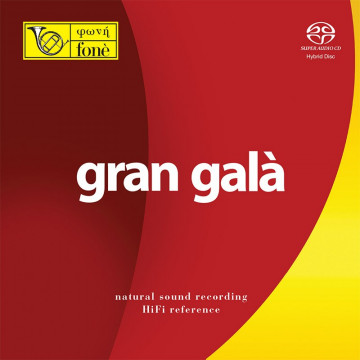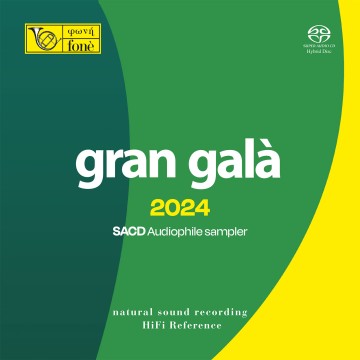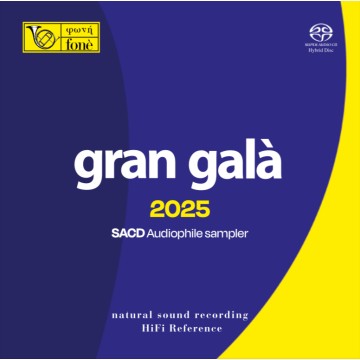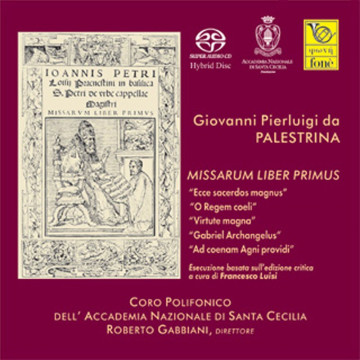Lodoletta - P. Mascagni (High Resolution Audio)
[Hi-Res Audio] Lodoletta - P. Mascagni
De Liso, Zanetti, Altomare, Boscolo - Dir.: De Bernart
Lodoletta - P. Mascagni
CD n.1
Act I
1. Introduzione: Cercalo, cercalo (I Bimbi)
2. Grazie comari (Antonio)
3. Attenti. Prima la riverenza (Antonio)
4. Comari! Comari! Guardate! (La Pazza)
5. Una moneta d’oro!... (Antonio)
6. Di con che a far denari (Antonio)
7. Comari! Comari, che corsa! (Lodoletta)
8. Serenata delle fate (I Bimbi)
9. Ah! Cogliete le rame! (Lodoletta)
10. Lodoletta, la mamma t’ha mandato (Giannotto, Lodoletta)
11. Povero Antonio! (Comari)
12. Una bimba che piange? (Fammen, Lodoletta)
13. Mi trovò piccina (Lodoletta, Flammen)
14. Bimba, non piangere! (Flammen. Lodoletta)
15. Assopita!... (Flammen)
Act II
16. Introduzione
17. Oggi sarai finita (Lodoletta)
18. All’alba di novembre (Le Olandesine)
19. Bu! Bu! Bu! (I Bimbi, Lodoletta)
20. Che mattinata grigia! (Flammen, Lodoletta)
21. Ah! La mia grazia? (Flammen)
22. Non c’è nessuno.... (I Bimbi, Lodoletta)
23. Perché? Perché? Vanard? (Lodoletta, Giannotto)
24. Tu non dovresti piangere, Giannotto (Lodoletta, Giannotto)
25. Nessuno! Respiro! (Flammen)
26. Signor Flammen, lasciatemi! (Lodoletta, Flammen)
27. Se il fior della purezza è còlto, muore (Lodoletta, Flammen)
CD n.2
Act III
1. Introduzione
2. L’anno muore (Una voce)
3. Tempo di valzer
4. E quando mezzanotte scocca (Una voce)
5. Ah! Lasciami.... (Flammen, Franz)
6. Se Franz dicesse il vero! (Flammen)
7. Ah! Ritrovarla nella sua capanna (Flammen)
8. No! No! Non è più Flammen! (La Brigata, Franz, Maud)
9. Ah! Il suo nome! (Lodoletta)
10. Sono vicina a lui e posso dirgli (Lodoletta)
11. No, non è la sua casa!... (Lodoletta)
12. Bimbi del mio villaggio (Lodoletta)
13. Flammen! Pietà, pietà! (Lodoletta)
14. E quando mezzanotte scocca (Una voce)
15. Ah! Che cosa c’è? (Flammen)
RECORDING DATA Recording date September 1994
Recorded at Teatro La Gran Guardia, Livorno
Recording supervisor and sound engineer Giulio Cesare Ricci
Editing Michele Lippi
General producer Giulio Cesare Ricci
Microphones Nuemann U47 e U49
Advanced Mike Pre-amplifier NAGRA
Digital tape recorder Sony 20 Bit
Analog tape recorder Studel J37
Pre -amplifier Jeff Rowland CONSONANCE
Power amplifier Jeff Rowland MODEL 1
Monitor speakers B & W 801 series III
Cables power and signal Audioquest COBALT and LAPIS
After three years dedicated to the centenary celebrations of the early works of Pietro Mascagni (1990: Cavalleria Rusticana -1991: L’Amico Fritz -1992:I Rantzau, recorded in the full versions with modem techniques) 1993 saw the opera season involved in historical and critical recognition of the opera of realism and the relationship between the leaders of the GiovaneScuola Toscana (Mascagni, Puccini, Catalani). Instead, the 1994 season of the CEL -Teatro di Livorno focused on the continuation of the Mascagni Project, begun in 198 8, and particularly on the rediscovery of the less familiar works of the Livornese composer. The objective has consequently been concentrated upon a renewed look at a work from Mascagni’s late period. Lodoletta premeiered at the Teatro Costanzi of Rome in 1917 under the direction of the composer: The lead went to Rosina Storchio, the same soprano who in 1904 sang the lead at the opening of Puccini’s Madam Butterfly. At one time Lodoletta was virtually part of the repertory of opera companies and a favourite with such singers as: the sopranos Gilda Dalla Rizza, Bianca Bellicioni Stagno, Juanita Caracciolo, Mafalda Favero, Toti Dal Monte, Iris Adami Corradetti and Margherita Carosio as well as tenors: Beniamino Gigli, Tito Schipa and Giuseppe Campora. Lodoletta lead to the first collaboration between Mascagni with one of the best librettists and theatre man of his times, Giovacchino Forzano, Giacomo Puccini’s librettist for Suor Angelica and Gianni Schicchi. He was also to be the future librettist of Mascagni’s last popular success, Il Piccolo Marat. The story for Lodoletta is taken from an edifying novel, Two Little Wooden Shoes by Ouida, a well-known late nineteenth century English author, a story which had for some time attracted Puccini. The interest in reproducing Lodoletta lies in its wonderful score -one of Mascagni’s most refined, daring and “nineteenth century” at what was proving to be an extremely tortuous time in his creativity. It came after the mature and complex experience of the sumptuous and cruel decadence of Isabeau (with libretto by Illica) and Parisina (libretto by D’Annunzio). The opera also reflects the confluence and poetic affinity between the livornese composer and his rival colleague from Lucca who died in 1924. It is the expression of a Mascagni inclined to explore the soul and love - making of women in the mould of Puccini and particularly the “crepuscolare” intimacy already experimented in the young characters of Fritz and Rantzau with vivid brushstrokes and realistic tendency of biting modernity. The heroine’s final long monlogue and touching melody of the famous solo “Flammen Perdonami” known to the public and opera -lovers through historic recordings of some of the above-mentioned singers, as well as recent recorded versions by Renata Scotto and Mirella Freni which all provide valuable performances. Hence the CEL’s decision to reproduce this apparently delicate and fragile opera in a rather more bitter, dry and modern reading to avoid the affectation of the older tradition. It was, therefore, necessary to choose a musical director of refined taste and proven experience in Italian nineteenth century melodrama such as Massimo De Bernart. Whilst the drama direction is under Piera Degli Esposti, an actress linked to the naturalist and decadent theatre with, however, completely modern taste (thanks to the rigor and directing command of such theatre directors as Giancarlo Cobelli and Massimo Castri). With this Livornese production she makes a successful directing debut. She is supported by refined, original and creative set and costume designer -Ivan Stefanutti who has for years had a happy collaboration with the CEL lyrical seasons (Cavalleria Rusticana and La Lupa in 1990, L’Amico Fritz in 1991, I Rantzauin 1992). The trio De Bernart -Degli Espositi -Stefanutti has made a Lodoletta which is more tragic than lyrical, more hallucinated and spectral than mellifluous and mawkish. Despite an interpretative outlook so little attracted by the temptations of sentimentalism, it has managed to tug at the heart strings of the public who have acclaimed it, as have the critics whom it has enthused. With this as the key to the reading the young company have thrown themselves into the work with conviction. Particularly the delicate yet strong character of the lead singer Giovanna De Liso, gaining great personal reviews and establishing herself as one of the most interesting interpreters of the realist school in the current Italian choral world. The Camerata Musicale is a mixture of the orchestras performing in the lyrical season of Livorno and Pisa and the Coro Artisti Associati is lead by the young Livornese director Stefano Visconti. Finally, it must be pointed out that this is the first performance of Lodoletta at an Italian theatre after more than thirty years, when it was last seen at the Teatro Goldoni of Livorno, whilst the most recent performance was by the New Jersey Opera at an Americana theatre.
ALBERTO PALOSCIA

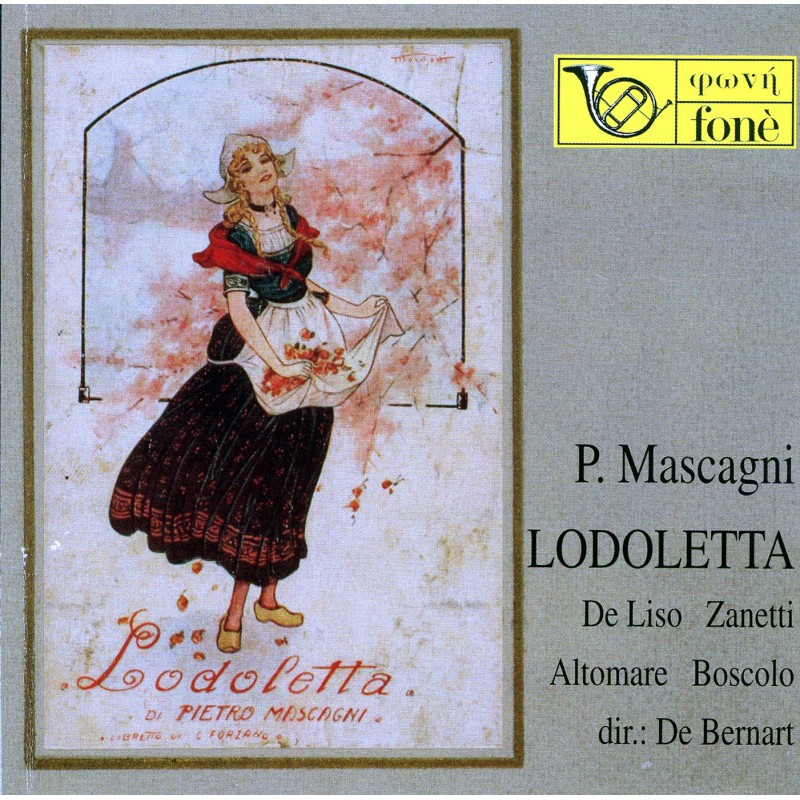

 Hd Tracks
Hd Tracks







